英语语法中的专有名词、抽象名词、物质名词
英语语法专业术语

英语语法专业术语结构structure从句clause词组phrase名词noun专有名词proper noun普通名词common noun可数名词countable noun不可数名词uncountable no抽象名词abstract noun具体名词concrete noun物质名词material noun集体名词collective noun个体名词individual noun及物动词transitive verb不及物动词intransitive verb系动词link verb助动词auxiliary verb情态动词modal verb规则动词regular verb不规则动词irregular verb短语动词phrasal verb动词不定式infinitive非谓语动词non-finite verb动名词gerund现在分词present participle使役动词causative verb感官动词verb of senses感叹词exclamation时间状语从句adverbial clause of time地点状语从句adverbial clause of place方式状语从句adverbial clause of manner让步状语从句adverbial clause of concession 原因状语从句adverbial clause of cause结果状语从句adverbial clause of result目的状语从句adverbial clause of purpose条件状语从句adverbial clause of condition 简单句simple sentence并列句compound sentence复合句complex sentence陈述句declarative sentence疑问句interrogative sentence一般疑问句general question特殊疑问句special question 方式副词adverb of manner程度副词adverb of degree时间副词adverb of time地点副词adverb of place修饰性副词adjunct连接性副词conjunct疑问副词interrogative adverb关系副词relative adverb代词pronoun人称代词personal pronoun物主代词possessive pronoun反身代词reflexive pronoun相互代词reciprocal pronoun指示代词demonstrative pronoun疑问代词interrogative pronoun关系代词relative pronoun不定代词indefinite物主代词possessive pronoun名词性物主代词nominal possessive形容词性物主代词adjectival possessivepronoun冠词article定冠词definite article不定冠词indefinite article数词numeral基数词cardinal numeral序数词ordinal numeral分数词fractional numeral形式form单数形式singular form复数形式plural form限定动词finite verb form非限定动词non-finite verb form原形base form从句clause从属句subordinate clause并列句coordinate clause名词从句nominal clause定语从句attributive clause状语从句adverbial clause宾语从句object clause主语从句subject clause主谓关系 subject-predicate relationship选择疑问句alternative question附加疑问句tag question肯定句positive sentence否定句negative sentence祈使句imperative sentence省略句elliptical sentence感叹句exclamatory sentence基本句型basic sentence pattern句子成分members of sentences主语subject谓语predicate宾语object双宾语dual object直接宾语direct object间接宾语indirect object复合宾语complex object补语complement主补subject complement宾补object complement表语predicative定语attributive同位语appositive状语adverbial并列coordinate从属subordination修饰modification前置修饰pre-modification后置修饰post-modification单数形式singular form复数形式plural form规则形式regular form不规则形式irregular form格case普通格common case所有格possessive case主格nominative case宾格objective case时态tense一般现在时present simple tense一般过去时past simple tense一般将来时future simple tense现在进行时present continuous tense 过去进行时past continuous tense现在完成时past perfect tense 过去完成时present perfect tense过去将来时past future tense语态voice主动语态active voice被动语态passive voice语气mood陈述语气indicative mood祈使语气imperative mood虚拟语气subjunctive mood否定negation全部否定full negation局部否定partial negation转移否定shift of negation语序order自然语序natural order倒装语序inversion直接引语direct speech间接引语indirect speech一致agreement主谓一致subject-predicate agreement 语法一致grammatical agreement概念一致notional agreement就近原则principle of proximity强调emphasis重复repetition语音pronunciation语调tone升调rising tone降调falling tone文体style正式文体formal非正式文体informal连字号hyphen祈使句imperative sentences主句indicative mood物质名词material nouns句子的成分members of the sentence 语气mood集体名词collective nouns普通格common case普通名词common nouns比较级comparative degree复合宾语complex Object复合句complex sentences并列复合句compound complex sentences 并列句compound sentences合成词compound words连词conjunction连接副词conjunctive adverbs连接代词conjunctive pronouns转化conversion并列连词co-coordinating conjunctions 可数名词countable nouns陈述句declarative sentences定冠词definite article比较的级别degrees of comparison指示代词demonstrative pronouns派生(词缀法)derivation ( affixation ) 直接宾语direct object直接引语direct speech反意问句disjunctive questions省略ellipsis省略句elliptical sentences感叹号exclamation mark感叹句exclamatory sentences物主代词possessive pronouns抽象名词abstract nouns选择问句alternative questions句子分析analysis of sentences助动词auxiliary verbs过去式past forms过去分词past participle谓语predicate表语predicative前缀prefix(es)介词短语prepositional phrases专有名词proper nouns相互代词reciprocal pronouns不定代词indefinite Pronouns关系副词relative adverbs关系代词relative pronouns自身代词self pronouns虚拟语气subjunctive mood后缀suffix(es)最高级superlative degree句型的转换transformation of sentences动词短语verbal phrases限定词determiner。
英语语法名词
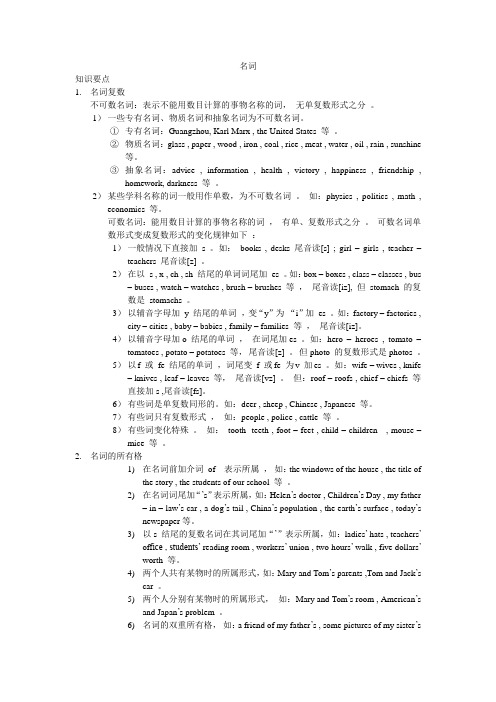
名词知识要点1.名词复数不可数名词:表示不能用数目计算的事物名称的词,无单复数形式之分。
1)一些专有名词、物质名词和抽象名词为不可数名词。
①专有名词:Guangzhou, Karl Marx , the United States 等。
②物质名词:glass , paper , wood , iron , coal , rice , meat , water , oil , rain , sunshine等。
③抽象名词:advice , information , health , victory , happiness , friendship ,homework, darkness 等。
2)某些学科名称的词一般用作单数,为不可数名词。
如:physics , politics , math , economics 等。
可数名词:能用数目计算的事物名称的词,有单、复数形式之分。
可数名词单数形式变成复数形式的变化规律如下:1)一般情况下直接加s 。
如:books , desks 尾音读[s] ; girl –girls , teacher –teachers 尾音读[z] 。
2)在以s , x , ch , sh 结尾的单词词尾加es 。
如:box – boxes , class – classes , bus – buses , watch – watches , brush – brushes 等,尾音读[iz], 但stomach 的复数是stomachs 。
3)以辅音字母加y 结尾的单词,变“y”为“i”加es 。
如:factory – factories , city – cities , baby – babies , family – families 等,尾音读[iz]。
4)以辅音字母加o 结尾的单词,在词尾加es 。
如:hero –heroes , tomato –tomatoes , potato – potatoes 等,尾音读[z] 。
安徽省普通高等学校专升本招生考试主要英语语法复习
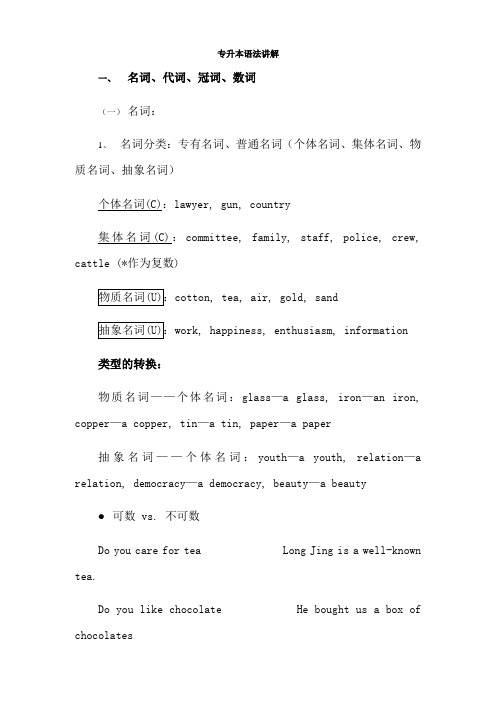
专升本语法讲解一、名词、代词、冠词、数词(一)名词:1、名词分类:专有名词、普通名词(个体名词、集体名词、物质名词、抽象名词)个体名词(C):lawyer, gun, country集体名词(C):committee, family, staff, police, crew, cattle (*作为复数)cotton, tea, air, gold, sandwork, happiness, enthusiasm, information 类型的转换:物质名词——个体名词:glass—a glass, iron—an iron, copper—a copper, tin—a tin, paper—a paper抽象名词——个体名词:youth—a youth, relation—a relation, democracy—a democracy, beauty—a beauty 可数 vs. 不可数Do you care for tea Long Jing is a well-known tea.Do you like chocolate He bought us a box of chocolatesHave some coffee. Two coffees, please.●不可数名词的量A piece of news/ advice/ information/ work…A bottle of milk/ ink…2、名词的数:单数、复数特殊的名词复数:●以“O”结尾,不加es的: 末尾为两个元音字母;外来词:radios, bamboos, zoos; photos, pianos, memos, tobaccos●以“f/fe”结尾,直接加es的:Roofs, cliffs, proofs, hoofs, chiefs, gulfs,beliefs●不规则形式:英语中古的复数形式;外来词Man-men, tooth—teeth, child-children, ox-oxenPhenomenon-phenomena, thesis-theses, crisis-crises, criterion-criteria●单复数同形:Chinese, Japanese, aircraft, sheep, deer, fish, swine, means, series, species…●合成名词的复数:只把主体名词改为复数:looker(s)-on, runner(s)-on, son(s)-in-law由man/woman构成的合成名词,全部都变:man-servant—men-servants, woman doctor—women doctors●常以复数形式出现的:两部分构成的;以-ing结尾的;其他Scissors, trousers, glasses, pants…Belongings, surroundings, savings, findings…Statistics, overalls, congratulations, clothes, stairs●以-s为词尾,但做单数看的词:Phonetics, politics, physics3. 名词的格:’s; “of”4. 名词在句中的作用:作主语、宾语、表语、定语、补语等●主语:Complacency is the enemy of study.●表语:We are all servants of the people.●宾语:He knows five languages.●定语:Is it a colour TV●补语:We elected him our monitor.二、代词:人称代词、物主代词、自身代词、相互代词、指示代词、疑问代词、关系代词、连接代词、不定代词1、人称代词、物主代词、自身代词2、相互代词:one another, each otherWe can help one another (each other).3、指示代词:this, that, these, those●指前面提到的事物:that, those (避免重复)The best coal is that from Newcastle.These machines are better than those we turned out last year.●*如果名词是单数可数名词,用the one更多I’ll take the seat next to the one by the window.My room is lighter than the one next door.●指下面要说的事物:this, theseI want to know this: Has John been here●Such: 作定语、主语、表语We have has such a busy day.Such are the results.His illness was not such as to cause anxiety.4. 疑问代词:who, whom, whose, what, which5.关系代词:引起定语从句who, whom, whose, that, which, (such…) as6.连接代词:引起主语从句、宾语从句、表语从句(所有的疑问代词、what)7、不定代词:all, each, every, both, either, neither, one, none, little, few, many, much, other another, some, any, no 及由some, any, no, every构成的合成代词。
英语名词概述1

thank
不可数名词
2.普通名词
物质名词不可数,但表 示具体的东西时,则变 可数,意思也改变:
物质名词: 表示无法分为个体
的实物,如:air, coffee, fire, iron, furniture
集体名词: 表示若干个个体组成
的集合体,如:family ,public, cattle, government, people, police
抽象名 词
difficulty experience failure knowledge
困难 经验 失败 知识
a failure
have a good knowledge of
He is a failure as a doctor. He has a good knowledge of English.
可数名词的复数变化(规则)
Video 1 Video 2 Video 3 Let’s have a summary.
可数名词的复数变化(规则)
情况 一般情况 以s, x, ch, sh结尾的词 加法 加-s 加-es 例词 brothers; schools buses; watches; dishes
以辅音+y结尾的词
以辅音+o 结尾的词 以f或fe结尾的词
去y加-ies
多数加-es 把f/fe改成ves
ladies; countries
heroes; mangoes halves; leaves
其它名词复数的规则变化
1) 以y结尾的专有名词,或元音字母+y 结尾的名词变 复数时,直接加s变复数。例如: monkey---monkeys holiday---holidays 2) 以o 结尾的名词,变复数时: a. 加s,如: photo---photos, piano---pianos b. 加es,如: potato—potatoes tomato--tomatoes c. 上述a和b两种方法均可,如zero---zeros / zeroes
英语语法中的专业术语的翻译
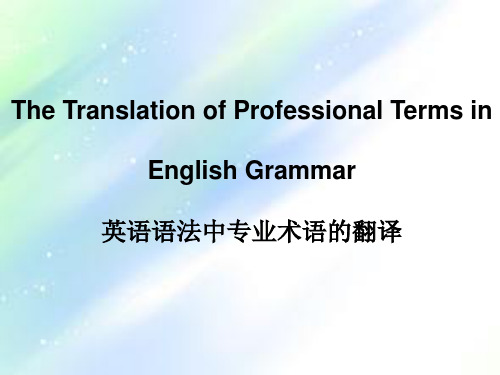
感叹词 interjection 缩写 int.
代词pronoun 缩写pron.
名词 noun 缩写n.
☆普通名词 common noun (集体名词 collective noun/个体名词 individual noun
物质名词 material noun/ 抽象名词 abstract noun ) ☆专有名词 proper noun
☆可数名词 countable noun 不可数名词 uncountable noun
关联词 connective
从句 clause
从属句 subordinate clause
并列句 coordinate clause
☆名词从句 nominal clause
主语从句 subject clause
宾语从句 objective clause
表语从句 predicative clause
同位语从句 oppositive clause
定冠词 definite article 不定冠词 indefinite article
☆数词 numeral 缩写num.
基数词 cardinal numeral 序数词 ordinal numeral
连词 conjunction 缩写 conj.
☆并列连词 coordinating conjunction 从属连词 subordinating conjunction
☆定语从句 attributive clause
英语名词用法大全
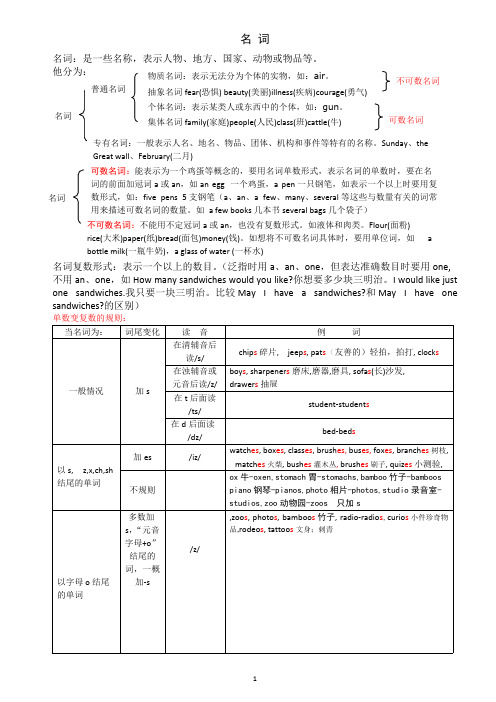
Chinese 中国人,sheep 羊,deer 鹿,fish 鱼, Japanese 日本人,li,jin,yuan,two li,three
mu,four jin,但除人民币元、角、分外,美元、英镑、法郎等都有复数形式。如:a dollar, two dollars; a meter, two meters
单数变复数的规则:
当名词为: 词尾变化 读 音
例
词
一般情况
在清辅音后 读/s/
chips 碎片, jeeps, pats(友善的)轻拍,拍打, clocks
在浊辅音或 boys, sharpeners 磨床,磨器,磨具, sofas(长)沙发,
元音后读/z/ drawers 抽屉 加s
在 t 后面读 /ts/
名词
名词:是一些名称,表示人物、地方、国家、动物或物品等。
他分为:
物质名词:表示无法分为个体的实物,如:air。
普通名词
抽象名词 fear(恐惧) beauty(美丽)illness(疾病)courage(勇气)
名词
个体名词:表示某类人或东西中的个体,如:gun。 集体名词 family(家庭)people(人民)class(班)cattle(牛)
German 不是合成词,故复数形式为 Germans;
3、集体名词,以单数形式出现,但实为复数。
2
如: people police cattle 等本身就是复数,不能说 a people,a police,a cattle,但可以说 a person,a policeman,a head of cattle,the English,the British,the French,the Chinese,the Japanese,the Swiss 等名词,表示国民总称时,作复数用。如: The Chinese are industries and brave. 中国人民是勤劳勇敢的。
英语语法名词
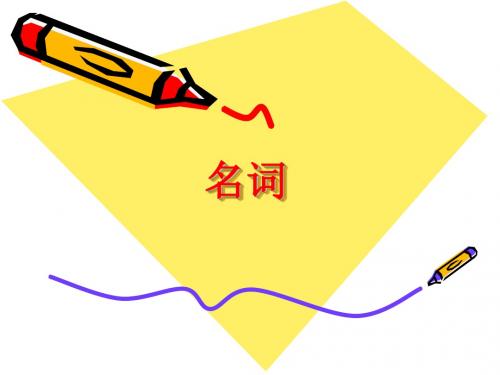
少数不规则名词复数变化
有些名词单复数同形 sheep-sheep; fish-fish; deer means手段 Chinese Japanese species种类 series系列 aircraft飞机
• 1. 物质名词
三、 不可数名词量的表示
a. 当物质名词转化为个体名词时。
比较:Cake is a kind of food. 蛋糕是一种食物。 ( 不可数 ) These cakes are sweet. 这些蛋糕很好吃。 ( 可数 ) This factory produces steel. ( 不可数 ) We need various steels. ( 可数 ) Our country is famous for tea. ( 不可数 ) 我国因茶叶而闻名。 Two teas, please. ( 可数 ) 请来两杯茶。
• 例: man-men; woman-women; child-children; foot-feet; tooth-teeth; goose-geese ox-oxen Policeman-policemen Policewoman-policewomen Englishman-Englishmen gentleman-gentlemen 注意:German-Germans
四、 定语名词的复数
• 名词作定语一般用单数,但也有以下例外。 1. 用复数作定语。 如: sports meeting 运动会 students reading-room 学生阅览室 talks table 谈判桌 the foreign languages department外语系 2. man, woman, gentleman 等作定语时,其单复 数以所修饰的名词的单复数而定。 如: men workers, women teachers, gentlemen officials
英语语法名词

people trousers
clothes
shoes
glasses
这些名词作主语时,注意它们的谓语用 复数 * My clothes are newer than yours.
3.可数名词可以被a, an, one, two以及 how many,many,a few,few,any, lots of, a lot of , some等修饰
★6. 名词做主语时,应注意名词的数,避免主 谓不一致。 * Her family is a large one and her family are all teachers. 她家是一个大家庭,她的家人都是老师。
重难点突破 5. Where is Tom? ---He has gone to the _____. D
* Children’ s Day * men’ s shoes
4.无生命名词的所有关系用of加名词, 构成所属关系的短语
*the color of the wall *a picture of the classroom
1. June 1st is ____Day. All the Children enjoy it C very much. A. Children B. Childrens’ C. Children’s D. Child C 2. The two bedroom are the ____. A. twins B. twin’s C .twins’ D. twins
名词单数的表达 一般可用a,an,one来修饰 注:a用于辅音音素开头的单词前,an用 于元音音素开头的单词前
*a book * an English book * an hour
找规律,总结规则
英语名词的种类
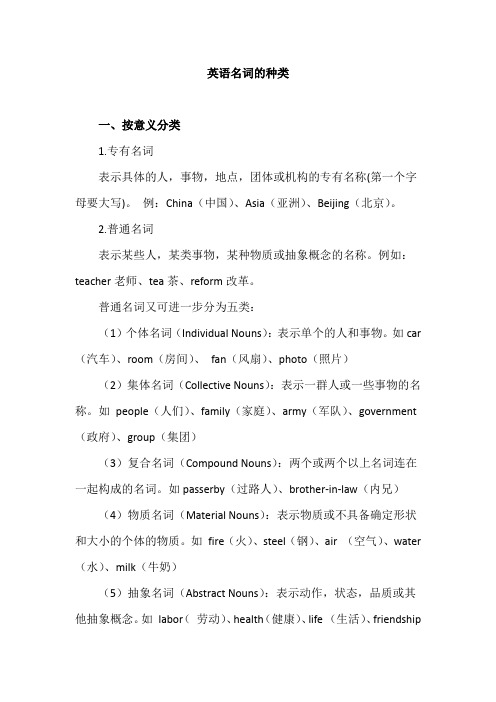
英语名词的种类一、按意义分类1.专有名词表示具体的人,事物,地点,团体或机构的专有名称(第一个字母要大写)。
例:China(中国)、Asia(亚洲)、Beijing(北京)。
2.普通名词表示某些人,某类事物,某种物质或抽象概念的名称。
例如:teacher老师、tea茶、reform改革。
普通名词又可进一步分为五类:(1)个体名词(Individual Nouns):表示单个的人和事物。
如car (汽车)、room(房间)、fan(风扇)、photo(照片)(2)集体名词(Collective Nouns):表示一群人或一些事物的名称。
如people(人们)、family(家庭)、army(军队)、government (政府)、group(集团)(3)复合名词(Compound Nouns):两个或两个以上名词连在一起构成的名词。
如passerby(过路人)、brother-in-law(内兄)(4)物质名词(Material Nouns):表示物质或不具备确定形状和大小的个体的物质。
如fire(火)、steel(钢)、air (空气)、water (水)、milk(牛奶)(5)抽象名词(Abstract Nouns):表示动作,状态,品质或其他抽象概念。
如labor(劳动)、health(健康)、life (生活)、friendship(友情)、patience(耐力)二、按是否可数分类1. 不可数名词不可数名词是指不能以数目来计算,不可以分成个体的概念、状态、品质、感情或表示物质材料的东西;它一般没有复数形式,只有单数形式,它的前面不能用不定冠词a / an。
抽象名词,物质名词和专有名词一般是不可数名词。
如milk(牛奶),bread(面包),coffee (咖啡)等。
2. 可数名词可数名词是指能以数目来计算,可以分成个体的人或东西,因此它有复数形式。
如cup(杯子),cat(猫)等。
英语语法名词

1). 表示时间,如: today`s newspaper今天的报纸, two days` work 两天的工作
2). 表示度量衡及价值 a mile`s distance 一英里的距离,ten dollars` value 10美元的价值
I saw the boy .我看到那个男孩。(boy 作动词saw的宾语) Give the money to your brother. 把这些钱给你兄弟。(brother 作介词to的宾语)
3. 表语 He is a clever boy. 他是个聪明的孩子。
4. 宾语补足语 They called him a fool. 他们叫他傻瓜。
1)一般加-s
如:map------maps地图 field------fields田地
2)以s, x, sh, ch 结尾的名词后加-es
如:class---classes班,box---boxes盒子 dish---dishes盘子, match---matches比赛
如: John`s father 约翰的父亲, spiders` web 蜘蛛网
2. 名词所有格的构成
1)一般直接加" ` ",
如: this child`s book这个小孩的书, children`s books儿童书籍
2)加了-s 或-es 的复数名词后,只加" ` ",
如:work工作,honesty诚实,courage勇气
名词按其可数性分为可数名词(countable nouns)和不可数名词(uncountable nouns)。类名词皆可数,集体名词大都可数,专有名词、物质名词和抽象名词多不可数。
英语语法中的专有名词、抽象名词、物质名词

抽象名词不可数名词是因不能数而无单复数之分的名词,一般可用no, any, some, a little, much 等修饰,如food(食物),news(新闻),fruit(水果),bread(面包),hunger(饥饿),truth(真相)等。
There is some food on the table.桌上有一些食物。
There is much news in the newspaper.报纸上有大量新闻。
You can eat any fruit on the table.你可以吃桌上的任何水果。
A little bread is left in the basket.筐里剩下一点面包。
They feel no hunger now.他们不感到饿了。
不可数名词包括物质名词、抽象名词和专有名词。
抽象名词是动作、性质、概念、状态等的名称,如:washing(洗衣),kindness(仁慈),time(时间),friendship(友谊),hope(希望)等。
Mother is doing some washing.妈妈正在洗衣服。
表动作:washing 洗衣Mother is much moved by his kindness.妈妈被他的仁慈深深打动。
表性质:kindness 仁慈It's time to go to bed, boy!孩子,睡觉的时间到了!表概念:time 时间Our friendship is everlasting.我们的友谊地久天长。
表概念:friendship 友谊1. 抽象名词一般无复数形式,不加冠词,只有特指时加the。
The friendship between us is long and lasting.我们的友谊地久天长。
friendship是特指的。
2. 有些抽象名词可与of连用,起形容词的作用。
Your gift is of great value.你礼物的价值很大。
英语语法考点专题-名词(课件) (共24张)

9. We are having dinner at my aunt tonight. aunt→ aunt’s 指到“我姨母的”家里吃饭。at my aunt’s 相当于at my aunt’s home。
10. In our school, there is a new lab building with lots of teaching equipments in it. equipments→ equipment 因为equipment是不可 数名词,没有复数形式。
名词训练 一、单句填空
1.Why do you choose to work in an international travel agency? —Well, you know, English is my strength ________.So it is my best choice. (strong)
11. This kind of dress was popular in the ______________(1980). 1980s/1980’s 12. The town is about two _________(hour) ride hours’ from here. You ought to start right away. 13. Some ___________(German) visited our Germans school last Wednesday. 14. The _________(roof) of the room were covered roofs with _________(leaf). leaves 15. On the whole, he was a _________(fail) in his failure life.
高中英语语法复习--名词

高中英语语法复习天津市汉沽区第五中学刘华名词专有名词(Proper Nouns)普通名词(Common Nouns)个体名词(Individual Nouns)集体名词(Collective Nouns)物质名词(Material Nouns)抽象名词(Abstract Nouns)不可数名词(Uncountable Nouns)可数名词(Countable Nouns)Proper Nouns:指人名、地名及某些人和事物专有的名称Tom; Beijing; Americans;English; May; New Year’s Day 注意:专有名词的第一个字母要大写Common Nouns:专有名词以外的名词都是普通名词1。
Individual Nouns:指作为个体而存在的人或东西。
可以指具体的人或物。
aunts; a panda; apartments也可指抽象东西。
a year; fairy tales; a dream2. Collective Nouns:表示由个体组成的集体。
army; audience; crew; family; team;police; government; public集体名词有时作单数看待,有时作复数看。
一般来说,视为整体时作单数看,突出它的成员时作复数看。
His family isn’t large.His family are all music lovers.在不少情况下,集体名词后单复数动词都可以用,没什么差别。
The audience was (were) excited by the show.3.Material Nouns:指无法分为个体的东西。
beer; cake; cloth; cotton; detergent; fur; ice; paint; paper; soil一般来说,物质名词是不可数的,因而没有复数形式。
但有一些特殊情况:1)有些物质名词可用作可数名词,表示“一份”、“一杯”、“一种”Two strong black coffees, please.( 两份)Three beers, please.(三杯)It was a special tea.(一种)2)个别物质名词的复数形式可以表示特别的意义。
英语语法之名词

一、名词的分类1、专有名词:指某人;某地;某机构等专有的名称;其首字母要大写..如HongKong; China;Bill Clinton;Red Cross2、普通名词:可数名词:个体名词:表示某类人或东西中的个体;如 student;book 集体名词:表示若干个体组成的集合体;如:family;school; group; people不可数名词:物质名词:表示无法分为个体的实物;如:cotton;air;tea抽象名词:表示抽象概念;如 :work;happiness;news二、名词的复数可数名词有单、复数形式;其复数的构成规则如下:1、绝大多数在词尾加s..如:book;books;bag;bags;cup;cups;face;faces.2、以ch;sh;s;x;o结尾的名词加es..如:watch;watches;brush;brushes;hero;heroes;class;classes;下列以o结尾的词加s构成复数:piano ; photo ;radio ;zoo; bamboo ;kilo3、以辅音字母+y结尾的名词;将y改为i;再加es..例如:baby;babies;family;families;以元音字母+y结尾的名词;直接加s..例如:boy;boys;key;keys4、以f或fe结尾的名词;先将f或fe改为v;再加es构成复数形式;如:leaf;leaves; wife;wives.但有些以f结尾的名词;是在f后加s构成复数;常见的有:roof;chief;belief;gulf等..个别的两种方式都可以;如handkerchief’s;handkerchieves5、少数名词的复数形式是不规则的;要一一背记:man→men; woman→women; Englishman→Englishmen;foot→feet;tooth→teeth; child→children; mouse→mice少数名词的单、复数形式相同;如:Chinese;Japanese;sheep;deer; fish; means 注:fishes表不同种类的鱼6、复合名词:A.含man或woman的复合名词;两部分都变为复数形式..如:two men teachers; four women doctorsB.将复合名词中的主体名词变为复数形式;如:lookers-on旁观者;editors-in-chief总编辑; passers-by过路人C.如果没有主体名词;就在词尾后加s..如:grown-ups 成年人;go-betweens 中间人7、以复数形式出现的名词:trousers;glasses眼镜;scales天平;savings储蓄;findings 调查结果; doings行为;surroundings环境;arms武器;fireworks 烟火;remains残余;thanks感谢;riches财富;ashes灰烬 ;stairs 楼梯8、有些名词在一定的词组中要用复数形式..例如:take pains下功夫;made preparations作准备;give regards to 问候三、名词的所有格1、名词的所有格一般用于有生命的名词..其构成多在词尾加上“’s”;如:Tom’s bike;Marx’s works以s结尾的专有名词;在词尾后加“’”或“’s”..如:Engels’/Engels’s works以s结尾的复数名词;只在词尾加“’”..如:students’ homework;a workers’ night school 一所工人夜校;不以s结尾的复数名词;仍在词尾加“’s”..如:men’s clothes男士衣服 children’s books 儿童读物2、如果一个事物为两个人共有;只在后一个名词的词尾加“’s”;如果不是共有;就要在两个名词的词尾分别加上“’s”..例如:Tom and Mike’s room汤姆和迈克合住的房间 Tom’s and Mike’s rooms汤姆、迈克各自的房间3、表示店铺或某人的家时;常在名词所有格后省去shop;house等名词..如:the tailor’s 裁缝店;the barber’s理发店;go to the doctor’s上诊所;at my uncle’s在我叔叔家4、表示时间、距离、国家、城市等无生命的名词;可以在词尾加“’s”或“’”来表示所有格..如:today’s newspaper;half an hour’s rest;twoweeks’ work;ten minutes′walk;China’s population;Shanghai’s industry5、表示无生命的名词一般用of短语表示所有关系..如:the students of their school; the teachers of Grade 26、表示所属物的名词前如果有不定冠词、数词、不定代词;常用“of+所有格”来表示所属关系..例如:He is an old friend of my father’s. This is a picture of Mary’s.△考点分析1.He gained his _______by printing _______of famous writersA.wealth; workB.wealths; worksC.weaths;workD.wealth ;works析:此题答案D..因为wealth 是不可数名词故可排除B、C两个选项;work既可作不可数名词表“工作”意;又可作可数名词表“作品”意;常用复数形式..根据题目意思;此处work应作可数名词用;于是又可排除A..2.Many people agree that_______ knowledge of English is a mustin ______ international trade today.A.a; ×B.the ; anC.the ;theD.×;the析:knowledge 是抽象名词;一般不与不定冠词连用;但指具体“一门学问”或“一门学问的掌握了解”可与不定冠词连用;这可称之为抽象名词具体化..类例如:a strong character 坚强的性格;a bright future光明前途;a waste of time 浪费时间;a pressure on sb.对某人的压力;have a good time玩得痛快;He is a failure /a success as a leader 他当领导不行/很出色..抽象名词不与冠词连用是泛指一般概念、意义..如:what fun fine weather ;common knowledge 常识;Knowledge begins with practice.foreign trade.因此international trade前不用冠词..由以上两点可确定答案为A..3.Oh; John _____you gave usA.How a great surpriseB.How pleasant surpriseC.What a pleasant surpriseD.What pleasant surprise析:正确答案为C..“a/an+形容词+抽象名词”是抽象名词具体化的常见形式..又如:an advanced culture 一种先进文化;a great interest 极大的兴趣;do him a good kindness帮了他一个大忙..4. She broke a _______ while she was washing up .A.glass wineB.wine glassC.wine’s glassD.glass of wine析:根据broke一词及四个选项;可确定空白处应选“酒杯”故可排除A、D;C不是表达“酒杯”的正确形式;只有B才是正确答案..英语中用名词作定语修饰名词的情况很多;这些作定语用的名词可表①分类意义②表时间、地点、称呼③表目的、手段、原料、来源、所属等意义..①例:woman driver ;telephone number ;school education ;research work ;coffee cup ;English teacher ;air pollution②例:book store ;winter sleep ;country life ;college student ;South China③例:milk bottle ;steam boat ;goat skin ;stone wall ;gas station ;lunch room ;tooth brush5.________terrible weather we’ve been having these daysA.WhatB.What aC.HowD.How a析:这是一个感叹句;how修饰形容词;副词或动词;what修饰名词..weather是不可数名词;其前不可加不定冠词a..因此这题正确答案是A..6.Shortly after the accident ;two _______police were sent to the spot to keep order .A.dozens ofB.dozen sC.dozens’ ofD.dozen析:正确答案是 D..dozen; score ;hundred; thousand ;million 等名词前面有数词或many ;several等词;且表示具体数目时;这些名词一般不用复数形式;但在下列短语中却加S;并与of连用:dozens of 许多的;scores of 好几十的;hundreds of 成百的;thousands of 上千的;millions of 数百万的7.I’ll look into the matter a s soon as possible .Just have a little ______.A.waitB.timeC.patienceD.rest析:由题干第一句意“我会尽快调查那件事”;可知下句是要对方不要着急;故答案应为C..这是由情景;语境确定答案题目..8.If by any chance someone comes to see me ;ask them to leavea _________.A.messageB.letterC.sentenceD.notice析:答案为A..道理同第7题..。
英语名词的分类
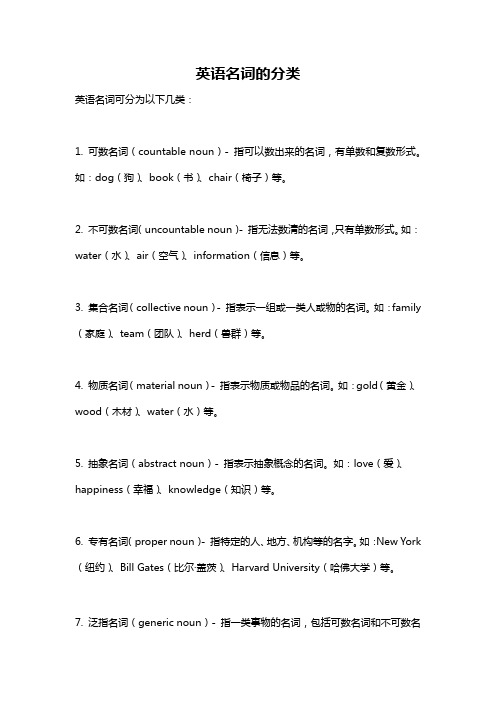
英语名词的分类
英语名词可分为以下几类:
1. 可数名词(countable noun)- 指可以数出来的名词,有单数和复数形式。
如:dog(狗)、book(书)、chair(椅子)等。
2. 不可数名词(uncountable noun)- 指无法数清的名词,只有单数形式。
如:water(水)、air(空气)、information(信息)等。
3. 集合名词(collective noun)- 指表示一组或一类人或物的名词。
如:family (家庭)、team(团队)、herd(兽群)等。
4. 物质名词(material noun)- 指表示物质或物品的名词。
如:gold(黄金)、wood(木材)、water(水)等。
5. 抽象名词(abstract noun)- 指表示抽象概念的名词。
如:love(爱)、happiness(幸福)、knowledge(知识)等。
6. 专有名词(proper noun)- 指特定的人、地方、机构等的名字。
如:New York (纽约)、Bill Gates(比尔·盖茨)、Harvard University(哈佛大学)等。
7. 泛指名词(generic noun)- 指一类事物的名词,包括可数名词和不可数名
词。
如:fruit(水果)、clothing(衣服)、meat(肉)等。
英语语法名词
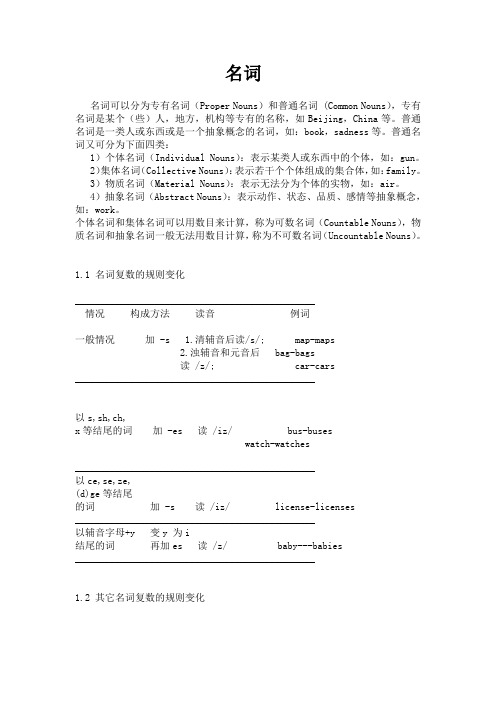
名词名词可以分为专有名词(Proper Nouns)和普通名词 (Common Nouns),专有名词是某个(些)人,地方,机构等专有的名称,如Beijing,China等。
普通名词是一类人或东西或是一个抽象概念的名词,如:book,sadness等。
普通名词又可分为下面四类:1)个体名词(Individual Nouns):表示某类人或东西中的个体,如:gun。
2)集体名词(Collective Nouns):表示若干个个体组成的集合体,如:family。
3)物质名词(Material Nouns):表示无法分为个体的实物,如:air。
4)抽象名词(Abstract Nouns):表示动作、状态、品质、感情等抽象概念,如:work。
个体名词和集体名词可以用数目来计算,称为可数名词(Countable Nouns),物质名词和抽象名词一般无法用数目计算,称为不可数名词(Uncountable Nouns)。
1.1 名词复数的规则变化________________________________________________情况构成方法读音例词一般情况加 -s 1.清辅音后读/s/; map-maps2.浊辅音和元音后 bag-bags读 /z/; car-cars________________________________________________以s,sh,ch,x等结尾的词加 -es 读 /iz/ bus-buseswatch-watches________________________________________________以ce,se,ze,(d)ge等结尾的词加 -s 读 /iz/ license-licenses________________________________________________以辅音字母+y 变y 为i结尾的词再加es 读 /z/ baby---babies________________________________________________1.2 其它名词复数的规则变化1) 以y结尾的专有名词,或元音字母+y 结尾的名词变复数时,直接加s变复数:如:two Marys the Henrysmonkey---monkeys holiday---holidays比较:层楼:storey ---storeys story---stories2) 以o 结尾的名词,变复数时:a. 加s,如: photo---photos piano---pianosradio---radios zoo---zoos;b. 加es,如:potato--potatoes tomato--tomatoesc. 均可,如:zero---zeros / zeroes3) 以f或fe 结尾的名词变复数时:a. 加s,如: belief---beliefs roof---roofssafe---safes gulf---gulfs;b. 去f,fe 加ves,如:half---halvesknife---knives leaf---leaves wolf---wolveswife---wives life---lives thief---thieves;c. 均可,如:handkerchief:handkerchiefs / handkerchieves1.3 名词复数的不规则变化1)child---children foot---feet tooth---teethmouse---mice man---men woman---women注意:与 man 和 woman构成的合成词,其复数形式也是 -men 和-women如: an Englishman,two Englishmen. 但German不是合成词,故复数形式为Germans;Bowman是姓,其复数是the Bowmans。
英语语法之名词

英语语法之名词1、名词分类⎪⎪⎪⎪⎩⎪⎪⎪⎪⎨⎧⎪⎪⎩⎪⎪⎨⎧⎩⎨⎧⎩⎨⎧raincoat watermelonsnowfall ability courage wealth honey beef wood wool team crew audience suitcase pal Fuji Mt Bible the ,,:,,,,,,,,.,复合名词抽象名词:物质名词:不可数名词集体名词:个体名词:可数名词普通名词专有名词:名词 ◆ 专有名词:表示人名、地名、书名、机构名、日期名、节日或某一事物专有名称的词称为专有名词。
例如:CIA 中央情报局,APEC 亚太经济合作组织,FIFA 国际足球联盟,Lost and Found 失物招领◆ 普通名词:是指一类人、事物、物质或抽象概念的名称。
细分为四类。
① 个体名词:指单个人或单个事物的名词。
例如:kid 孩子,friend 朋友,pencil 铅笔② 集体名词:指一群人或一些事物总称的名词。
例如:crowd 人群,group 组,faculty 全体教师,family 家人,class 一个班级的学生, crew 全体船员, people 人民③ 物质名词:指无法分为个体的物质、材料、食品、饮料、液体、气体、 金属等的名称。
例如:cotton 棉花,wool 羊毛,cloth 布,gold 黄金,rain 雨,gas 气体,solid 固体,liquid 液体④ 抽象名词1)意义:指人或事物的品质、情感、状态、动作等抽象概念及学科、疾病等的名称。
例如:honesty 诚实,love 热爱,improvement 提高,Chinese 语文2)习惯用法A.of +抽象名词:相当于相应的形容词,在句中可作表语、补足语和定语。
例如:a man of sense = a sensible man 一个有见识的人a man of wealth = a wealthy man 一个富人a man of experience = an experienced man 一个有经验的人a man of courage = a courageous man 一个有勇气的人a matter of great /much/little importance 一个非常/很/几乎重要的问题of great value 非常有价值,of ability 有能力的,of character 有品格的人B.of+表示大小、长短、深度、高度、年龄、颜色、材料的名词,可以作表语、补足语和定语。
英语词性语法总结归纳

英语词性语法总结归纳 英语的语法⼤家了解多少呢,对于英语来说,我们第⼀步要了解的就是应粗词性的分类,只有把词性了解透彻了,我们在阅读和写作当中,才能够出⾊的应对考题,⼩编在这⾥整理了相关知识,快来学习学习吧! 英语词性语法总结归纳 ⼀.名词 I. 名词的种类:专有名词普通名词国名.地名.⼈名,团体.机构名称可数名词不可数名词个体名词集体名词抽象名词物质名词 II. 名词的数: 1. 规则名词的复数形式: 名词的复数形式,⼀般在单数形式后⾯加-s或-es。
现将构成⽅法与读⾳规则列表如下:规则例词1⼀般情况在词尾加-s map-maps, sea-seas, girl-girls, day-days2以s, x, ch, sh结尾的名词后加-esclass-classes, box-boxes, watch-watches, dis h-dishes3以-f或-fe结尾的词变-f和-fe为v再加-esleaf-leaves, thief-thieves, knife-knives, loaf-loaves, wife-wives加-sbelief-beliefs, chief-chiefs, proof-proofs, roof-roofs, gulf-gulfs4以辅⾳字母加y结尾的名词,变y为i加-esparty-parties, family-families, story-stories, ci ty-cities5以元⾳字母加y结尾的名词,或专有名词以y结尾的,加-stoy-toys, boy-boys, day-days, ray-rays, Henry-Henrys6以辅⾳字母加-o结尾的名词⼀般加-eshero-heroes, Negro-Negroes, potato-potatoes, tomato-tomatoes不少外来词加-spiano-pianos, photo-photos, auto-autos, kilo-kilos, solo-solos两者皆可zero-zeros/zeroes, volcano-volcanoes/ volcanos7以元⾳字母加-o结尾的名词加-s radio-radios, bamboo-bamboos, zoo-zoos8以-th结尾的名词加-struth-truths, mouth-mouths, month-months, path-paths, 2. 不规则名词复数: 英语⾥有些名词的复数形式是不规则的,现归纳如下:规则例词1改变名词中的元⾳字母或其他形式man-men, woman-women, foot-feet, goose-gee se, mouse-mice2单复数相同sheep, deer, series, means, works, fish, species li, yuan, jin,3只有复数形式ashes, trousers, clothes, thanks, goods, glasses , compasses, contents4⼀些集体名词总是⽤作复数people, police, cattle, staff5部分集体名词既可以作单数(整体)也可以作复数(成员)audience, class, family, crowd, couple, group, co mmittee, government, population, crew, team, public , enemy, partycustoms(海关), forces(军队), times(时代), spirits(情6复数形式表⽰特别含义绪), drinks(饮料), sands(沙滩), papers(⽂件报纸), manners(礼貌), looks(外表), brains(头脑智⼒), greens(青菜), ruins(废墟)7表⽰“某国⼈”加-sAmericans, Australians, Germans, Greeks, Swedes, Europeans单复数同形Swiss, Portuguese, Chinese, Japanese以-man或-woman结尾的改为-men,-womenEnglishmen, Frenchwomen8合成名词将主体名词变为复数sons-in-law, lookers-on, passers-by, story-tellers, boy friends⽆主体名词时将最后⼀部分变为复数grown-ups, housewives, stopwatches 将两部分变为复数women singers, men servants III. 名词的所有格: 名词在句中表⽰所有关系的语法形式叫做名词所有格。
英语词性分类及定义

时间名词前介词用法口诀: 年前周前要用 in,具体日子要用 on,遇到几号也
用 on,上午下午得是 in,要说某日上下午用 on 换 in 清楚,午夜黄昏用 at——黎明用它也不错,at 用在时 分前,说“差”可要用上 to,说“过”要用 past。
并列连词——用来连接平行的 词、词组和分句
是一种虚词,连词不能独立担 任句子成分面只起连续词与词、 短语与短语及及句与句的作用。
2、持续系动词:用来表示主语继续或 保持一种状态或态度
3、表像系动词:用来表示“看起来像” 这一概念
4、感官系动词:主要有 feel, Smell, sou nd,taste
5、变化系动词:表示主语变成什么样 6、终止系动词:表示主语已终止动作
A、表示时态 B、表示语态 C、构成疑问句 D、与否定副词“not”合
4、自身代词(也称反身代词):表示“我(们)自己、 你(们)自己、他(们)自己”等的代词
5、相互代词:表示相互关系的代词
形 容 词性 物主 代词 —— 相当 形容 词 的 用法,应该位于名词的前面,
名 词 性物 主代 词— —相 当形 容词 性 物 主代词+名词,之后不接名词
1 、 用 作同 位语 — —加 强被 修 饰词 的 语 气,紧放在被修饰名词后或句末
三、形容词( adj.) 用来修饰名词,表示人或事物的性质、状态和特征的词
1、时间和频度副词
词
2、地点副词
类 ( 又 叫
四、副词( adv.) 用来修饰动词、形容词、副词、
介词、连词等单词或短语,以说明动
3、方式副词 4、程度副词
词
作性质或状态的特征的词
5、疑问副词
性
)
6、关系副词
英语语法之名词

➢ 不规则变化
复合名词的复数
例:woman teacher girl student
women teachers ; man doctor men doctors
girl students ; grown-up
grown-ups
son-in-law
sons-in-law
➢练习
1. The students of Grade 7 visited Mike’s farm and saw many C there .
4. —__A___ fathers didn’t come to the meeting. Why?
—Because they have gone to Beijing. A. Jeff’s and Amy’s B. Jeff and Amy C. Jeff’s and Amy D. Jeff and Amy’s
and
A. photos ; potatos ; radios
B. photos ; potatoes ; radios
C. photoes ; potatos ; radios
D. photos ; potatoes ; radioes
B
in them .
感谢观看 【学霸在线∙一对一在线学习平台】
个体名词:表示某类人或事物中的个体 例:teacher 集体名词:一群人或一类物的总称 例:class, family 物质名词:无法划分个体的物品的名称,
也指一类具有共同特点的物品的总称 例:air, water 抽象名词:表示性质、行为、状态、感情等抽象概念 例:happiness
可数名词
➢ 概念:可数名词所表示的事物一般能用数来计算。
- 1、下载文档前请自行甄别文档内容的完整性,平台不提供额外的编辑、内容补充、找答案等附加服务。
- 2、"仅部分预览"的文档,不可在线预览部分如存在完整性等问题,可反馈申请退款(可完整预览的文档不适用该条件!)。
- 3、如文档侵犯您的权益,请联系客服反馈,我们会尽快为您处理(人工客服工作时间:9:00-18:30)。
抽象名词
不可数名词是因不能数而无单复数之分的名词,一般可用no, any, some, a little, much 等修饰,如food(食物),news(新闻),fruit(水果),bread(面包),hunger(饥饿),truth(真相)等。
There is some food on the table.
桌上有一些食物。
There is much news in the newspaper.
报纸上有大量新闻。
You can eat any fruit on the table.
你可以吃桌上的任何水果。
A little bread is left in the basket.
筐里剩下一点面包。
They feel no hunger now.
他们不感到饿了。
不可数名词包括物质名词、抽象名词和专有名词。
抽象名词是动作、性质、概念、状态等的名称,如:washing(洗衣),kindness(仁慈),time(时间),friendship(友谊),hope(希望)等。
Mother is doing some washing.
妈妈正在洗衣服。
表动作:washing 洗衣
Mother is much moved by his kindness.
妈妈被他的仁慈深深打动。
表性质:kindness 仁慈
It's time to go to bed, boy!
孩子,睡觉的时间到了!
表概念:time 时间
Our friendship is everlasting.
我们的友谊地久天长。
表概念:friendship 友谊
1. 抽象名词一般无复数形式,不加冠词,只有特指时加the。
The friendship between us is long and lasting.
我们的友谊地久天长。
friendship是特指的。
2. 有些抽象名词可与of连用,起形容词的作用。
Your gift is of great value.
你礼物的价值很大。
相当于It is very valuable。
专有名词
1. 专有名词是指人、地方、称谓、机构、语言、国民、周日、月份、节日等的专有名称,第一个字母要大写,一般无复数形式,前面一般不加冠词。
December 25 is Christmas Day.
十二月二十五日是圣诞节。
My name is Peter and I am a Chinese.
我叫彼得,我是中国人。
I graduated from Harvard University and I work in a company on Wall Street.
我毕业于哈佛大学,在华尔街一家公司供职。
Can you speak English?
你会讲英语吗?
2. 有些专有名词,或在某种情形时的专有名词依然要有冠词。
比如Chinese, English等国语名称之后有language时,前面用定冠词the。
比较下面两句?
Can you speak Chinese?
你会讲中文吗?
No. The Chinese language is hard to learn.
不会。
中国话很难学。
3. 不定冠词a/an放在姓名之前表示与某名人类似的人。
I wish to become an Einstein.
我希望成为像爱因斯坦那样的人。
4. 专有名词用作单数普通名词。
Peter is very clever; perhaps he will be another Einstein.
彼得非常聪明,他将来可能成为另一位爱因斯坦。
5. 有些专有名词可用作复数普通名词,字尾要加-s或-es。
I always get up late on Saturdays. 星期六我总是起床晚
1. 物质名词是材料、食品、饮料以及固体、液体和气体的物质名称。
Do you have bread?
你们有面包吗?
Do you have milk?
你们有牛奶吗?
Do you have sugar?
你们有食糖吗?
Do you have cooking oil?
你这儿有食用油吗?
Do you have cloth?
你这儿有布料吗?
以上的句子中的bread, milk, sugar, oil, cloth都是物质名词。
2. 物质名词一般没有复数形式;表示物质名词的数量时,前面需加表示计量的名词。
We want two breads. ?
我们想要两个面包。
We want three milks. ?
我们想要三个牛奶。
We want a sugar. ?
我们想要一个食糖。
We also want two oils. ?
我们还想要两个食用油。
Mom, can we have three cloths, too? ?
妈妈,我们还可以再来三个布料吗?
应该这样说:
We want two pieces of bread. 我们想要两块面包。
three boxes of milk
三盒牛奶
one bag of sugar
一袋食糖
two barrels of cooking oil 两桶食用油
three pieces of cloth.
三块布料
.。
